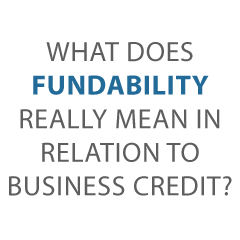- Connect With Us!
- (877) 600-2487
- info@creditsuite.com
What is Fundability in Reference to Business Credit
Published By Faith Stewart at March 25th, 2020
As a business owner, you may be beginning to hear the word fundability a lot. It may come from lenders, various media platforms, or your own current creditors. What is fundability? What does fundability really mean in relation to business credit? Fundability in reference to business credit is how lenders see your business when considering whether or not to lend money.
What Affects Fundability in Reference to Business Credit
It is one this to know what fundability is. Understanding what is means when it comes to business credit is another thing altogether. What does fundability look like practically when trying to get business funding?
When discussing fundability in reference to business credit, we are looking more at what credit issuers and loan providers want to see.
Find out why so many companies use our proven methods to get business loans.
Why Does Fundability in Reference to Business Credit Even Matter?
All businesses need funding. However, there is more than one way to get it.
(1) Grants
(2) Selling assets such as land, vehicles, equipment, or office space in buildings
(3) Crowdfunding
(4) Angel investing or venture capital payments, or
(5) Loans
When we talk about fundability in reference to business credit, we are talking about loans and other forms of debt. I mean, lenders are not going to hand out money to just anyone. Instead, they want to see if a business is a good credit risk. They need to know they will make money.
What Makes a Business Fundable in Reference to Business Credit?
There are way more factors that contribute to fundability in reference to business credit than most realize. You see, it is a complicated web that intertwines your personal life with your business in ways you may never truly understand. We try to break it down here.
Fundability in Reference to Business Credit: It Starts at the Beginning
Fundability, in reference to business credit, truly starts with how your business is set up. If your business is not already set up in the following way, it isn’t as fundable as it could be.
Contact Information
The first step to setting up a fundable business is to ensure your business has its own business phone number, fax number, and business address. That doesn’t mean you have to get a separate phone line, or even a separate location. You can still run your business from your home or on your computer.
EIN
The next thing you need to do is get an EIN for your business. This is an identifying number for your business that works in a way similar to how your SSN works for you personally. You can get one for free from the IRS.
Incorporate
Incorporating your business as an LLC, S-corp, or corporation is necessary to fundability. It lends credence to your business as one that is legitimate. It also offers some protection from liability.
Time in business affects fundability also, and that starts at the point of incorporation.
Business Bank Account
You have to open a separate, dedicated business bank account. There are a few reasons for this. First, it will make keeping personal and business expenses separate for tax purposes much easier. Next, it will help provide separation between the business and you as the owner for business credit building. There are many other reasons as well.
Licenses
Business licenses are necessary for a business to be legitimate. If it doesn’t, red flags are going to fly up all over the place. Do the research you need to do to ensure you have all of the licenses necessary to legitimately run your business at the federal, state, and local levels.
Website
I am sure you are wondering how a business website can affect your ability to get funding. Here’s the thing. These days, you do not exist if you do not have a website. However, having a poorly put together website can be even worse. It is the first impression you make on many, and if it appears to be unprofessional it will not bode well for you with consumers or potential lenders.
Spend the time and money necessary to ensure your website is professionally designed and works well. Pay for hosting too. Don’t use a free hosting service. Along these same lines, your business needs a dedicated business email address. Make sure it has the same URL as your Website. Don’t use a free service such as Yahoo or Gmail.
Find out why so many companies use our proven methods to get business loans.
Fundability in Reference to Business Credit: After the Set Up
How your business is set up is just the beginning of fundability when considered in reference to business credit. Here are the other things that affect the fundability of your business.
Business Credit Reports
Your fundability in reference to business credit hinges largely on the information in your business credit report. That is the credit report, much like your consumer credit report, that details the credit history of your business. It is a tool to help lenders determine how credit worthy your business is.
Where do business credit reports come from? There are a lot of different places. However, the main ones are Dun & Bradstreet, Experian, Equifax, and FICO SBSS. Make sure your reports are updated and accurate. You have no clue which ones your lender will choose to use.
Other Business Data Agencies
Some business credit reporting agencies directly calculate and issue credit reports. There are other business data agencies that affect those reports indirectly. Two examples are LexisNexis and The Small Business Finance Exchange. These two agencies gather data from a variety of sources, including public records. This means they could even have access to information relating to automobile accidents and liens. While you may not be able to access or change the data the agencies have on your business, you can ensure that any new information they receive is positive. Enough positive information can help counteract any negative information from the past.
Identification Numbers
In addition to the EIN, there are identifying numbers that go along with your business credit reports. When considering what is fundability, you need to be aware that these numbers exists. Some of them are simply assigned by the agency, like the Experian BIN. One, however, you have to apply to get. It is absolutely necessary that you do this.
Dun & Bradstreet is the largest and most commonly used business credit reporting agency. Every credit file in their database has a D-U-N-S number. To get a D-U-N-S number, you have to apply for one through the D&B website.
Business Credit History
This is where you really get to the heart of things when it comes to business credit reports. Your credit history has everything to do with all things related to your credit score. Of course, your business credit score is a huge factor in the fundability of your business.
Credit history consists of a number of things including:
- How many accounts are reporting payments?
- How long have you had each account?
- What type of accounts are they?
- How much credit are you using on each account versus how much is available?
- Are you making your payments on these accounts consistently on-time?
The more accounts you have reporting on-time payments, the stronger your credit score will be.
Consistency in Business Information
On the surface, it seems obvious that all of your business information should be the same across the board everywhere you use it. However, when you start changing things up, some things slip through the cracks. When adding a business phone number and address or incorporating, you can forget to make updates.
This is a problem because of fraud concerns. Per a 2009 Experian report, fraud-related costs for U. S. businesses are more than $50 billion annually. This could actually understate the extent of the problem, since some estimate up to 30 percent of all bad-debt commercial losses are due to ‘soft’ fraud. This is usually from material misrepresentation on an application.
When you consider this, along with the fact that business fraud is estimated to be three to 10 times more profitable than consumer fraud, you can see why it’s a problem.
Keep your information updated and consistent. In doing so, you’ll reduce the number for fraud signs sent up by your business.
Financial Statements
All financial statements count when discussing fundability in relation to business credit. First, there is the obvious. Both your personal and business tax returns need to be in order. Not only that, but you need to be paying your taxes, both business and personal.
Business Financials
Honestly, it is best to have an accounting professional prepare regular financial statements for your business. Having an accountant’s name on financial statements lends credence to the legitimacy of your business. If you cannot afford this monthly or quarterly, at least have professional statements prepared annually. Then, they are at the ready whenever you need to apply for a loan.
Personal Financials
Sometimes, tax returns for the previous three years will suffice. Get a tax professional to prepare them. This is the bare minimum you will need. Other information lenders may ask for include check stubs and bank statements, among other things.
Bureaus
Surprisingly, there are several other agencies that hold information related to your personal finances that you need to know about. Everyone knows about FICO. Your personal FICO score needs to be as strong as possible. It really can affect business fundability and almost all traditional lenders will look at personal credit in addition to business credit.
In addition to FICO reporting personal credit, you have ChexSystems. In the simplest terms, this keeps up with bad check activity and makes a difference when it comes to your bank score. If you have too many bad checks, you will not be able to open a bank account. That will cause serious fundability issues.
Likewise, everything comes into play for this point. Have you ever been convicted of a crime? Do you have a bankruptcy or short sell on your record? How about liens or UCC filings? All of this can and will play into the fundability of your business.
Personal Credit History
Your personal credit score from Experian, Equifax, and Transunion all make a difference. You have to have your personal credit in order because it will definitely affect the fundability of your business. Furthermore, if it isn’t great right now, get to work on it. The number one way to get a strong personal credit score or improve a week one is to make payments consistently on time.
Also, make sure you monitor your personal credit regularly to ensure mistakes are corrected and that there are no fraudulent accounts being reported.
Find out why so many companies use our proven methods to get business loans.
The Application Process
Truly, so much plays into this that you may not even think about. For example, consider the timing of the application. Is your business currently fundable? If not, do some work first to increase fundability. Next, ensure that your business name, business address, and ownership status are all verifiable. Lenders will check into it. Lastly, make sure you choose the right lending product for your business and your needs. Do you need a traditional loan or a line of credit? Would a working capital loan or expansion loan work best for your needs? Choosing the right product to apply for can make all the difference.
Fundability is Reference to Business Credit is a Whole New Ballgame for Some
The concept of fundability in reference to business credit is a new one for some business owners to grasp. Since business credit and personal credit are totally separate, it is hard to comprehend how one can truly affect the other in terms of fundability. The truth is, while one does not affect the other directly, the indirect effects of all of the above are far reaching.
Remember, to keep things moving smoothly, it is important to keep an eye on both your personal and business credit report. You can get a free copy of your personal credit report each year. In addition, there are a number of options for continuous personal credit monitoring for free.
Now, Business credit monitoring isn’t free. There are lower cost options for business however, if you know where to look.

 " class="attachment-blog-single size-blog-single wp-post-image" alt="Get Business Credit Cards for New Businesses Credit Suite-Business Line of Credit Decoded" title="Get Business Credit Cards for New Businesses">>
" class="attachment-blog-single size-blog-single wp-post-image" alt="Get Business Credit Cards for New Businesses Credit Suite-Business Line of Credit Decoded" title="Get Business Credit Cards for New Businesses">>